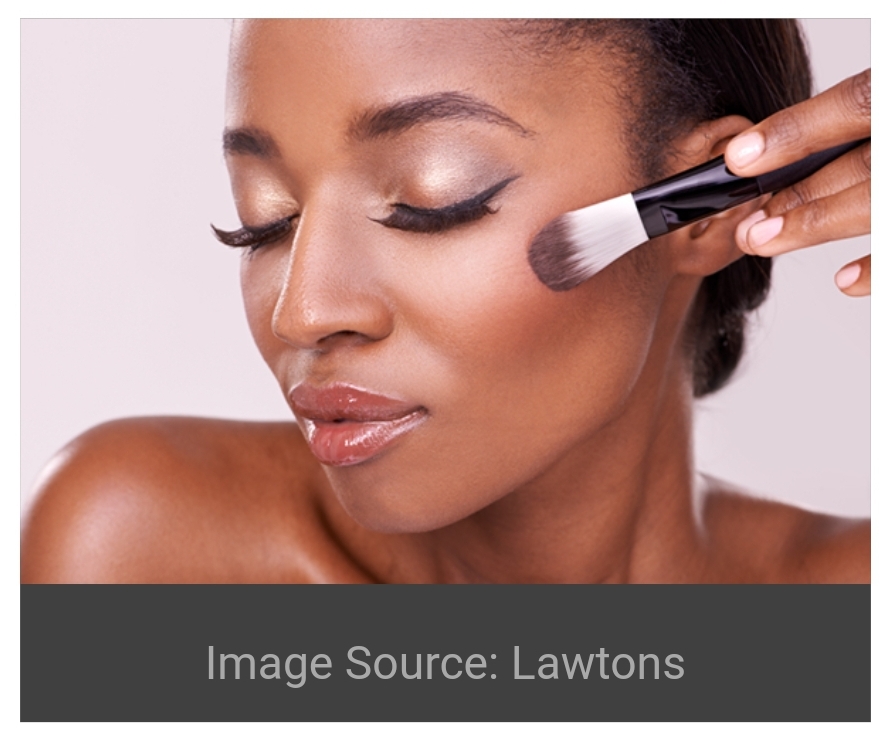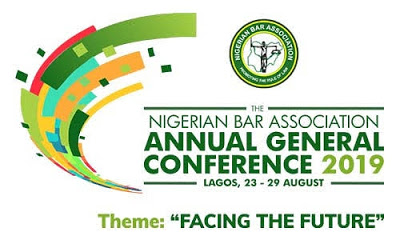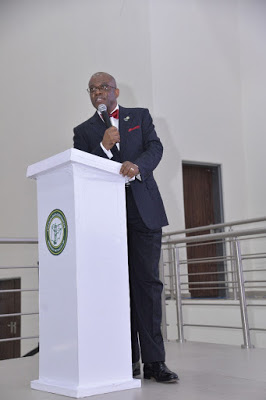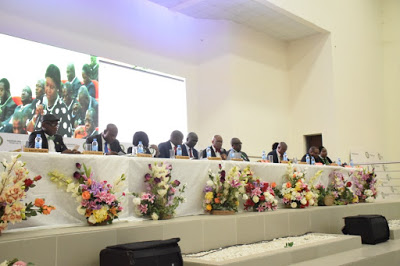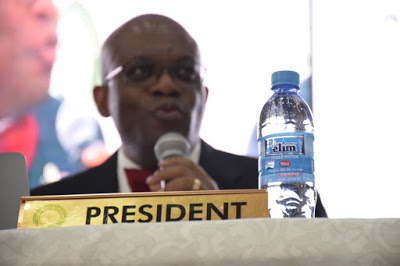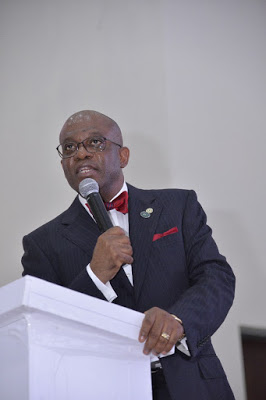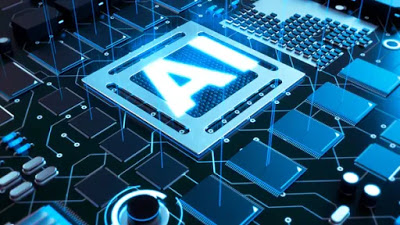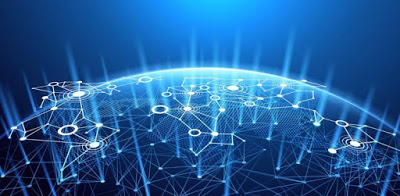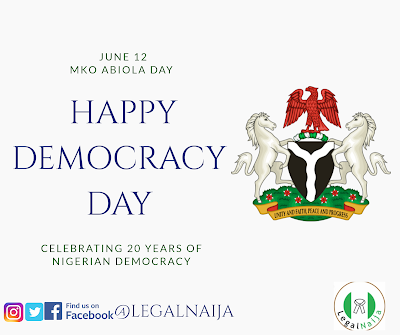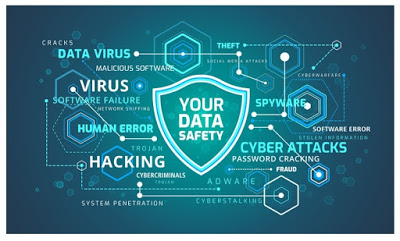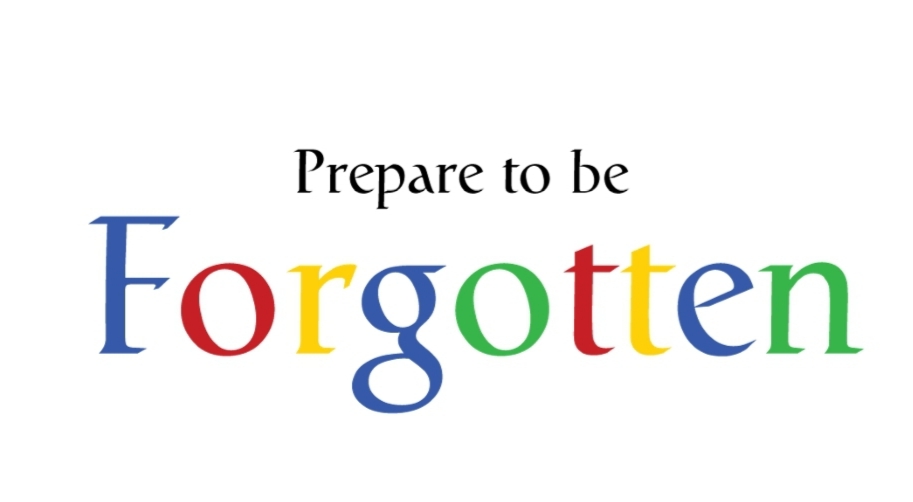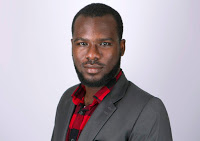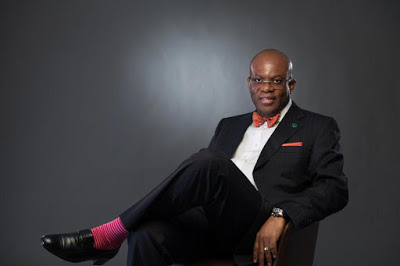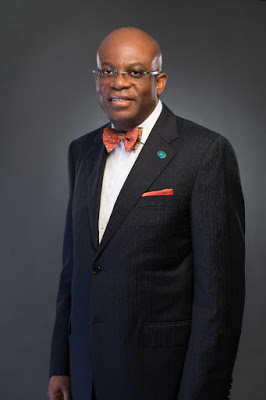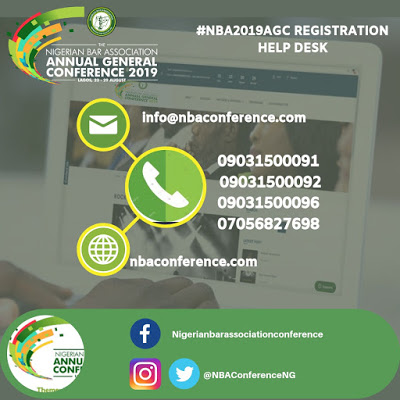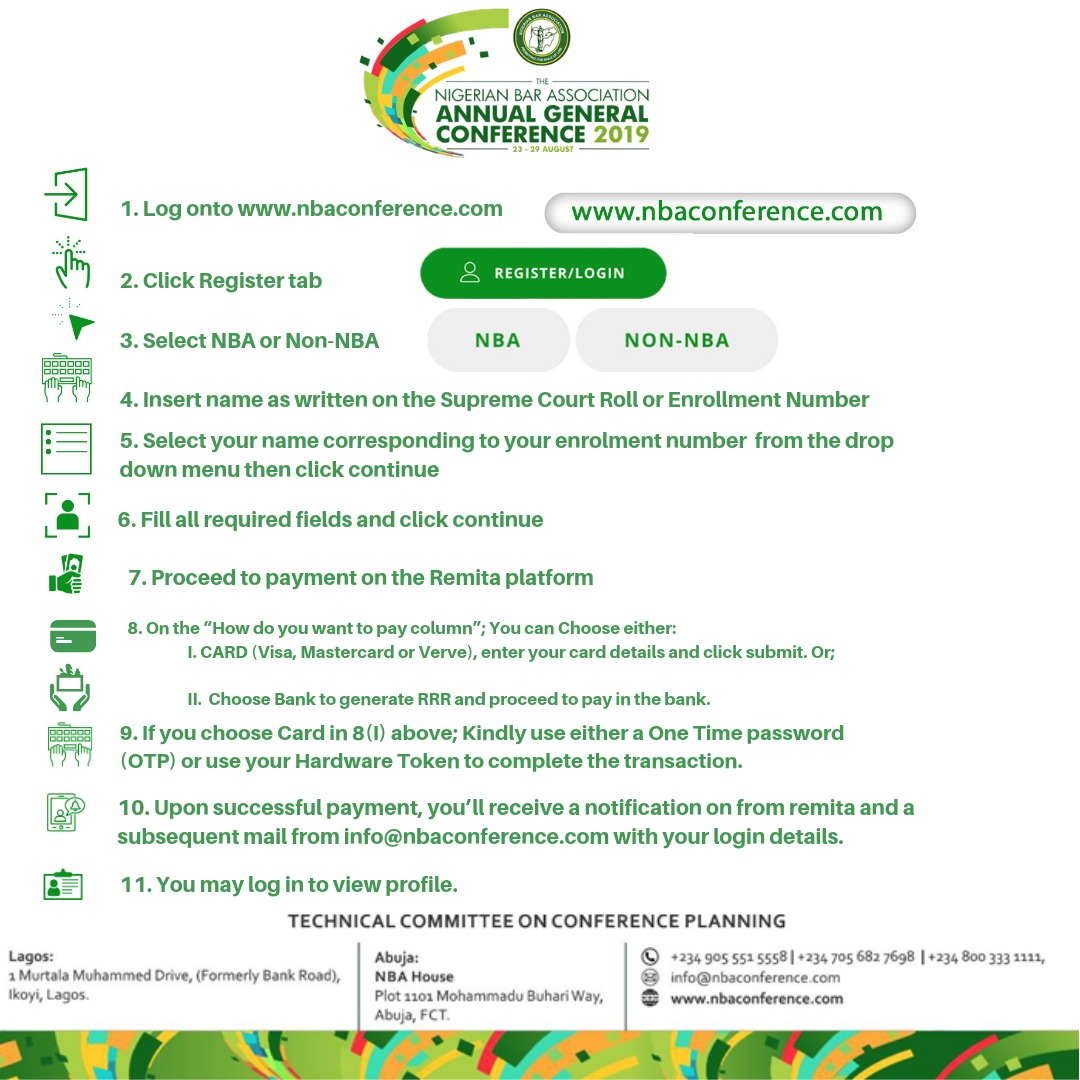This address was duly adopted by the National Executive Committee as the position of the Nigerian Bar Association on the state of the nation.
ADDRESS BY THE PRESIDENT OF THE NIGERIAN BAR ASSOCIATION
(“NBA”) PAUL USORO, SAN DELIVERED AT THE NBA NATIONAL EXECUTIVE COMMITTEE
(“NEC”) MEETING HOLDEN AT THE NBA
SECRETARIAT IN ABUJA ON 20 JUNE 2019
My Dear Colleagues
It is my privilege and honor to welcome you
to the 2018/2019 Quarter 3 NEC meeting of our great Association. We thank the Almighty for journey mercies
from our various destinations and we pray that He continues to envelop us in
His protective arms and grant us wisdom for today’s deliberations. It is perhaps not by coincidence that we are
holding this meeting only weeks after the winners of the 2019 National
Elections at the Federal and States levels were sworn into office on 29 May 2019
and after the celebration of our Democracy Day on June 12, 2019. While we congratulate the newly sworn in
elected officials, it behooves us, as an Association of Learned Men and Women,
to hold them to account and constantly remind them of their pact with the
Nigerian people. In that regard, I crave
your indulgence to raise two critical issues of urgency that affect us personally
and as Nigerians, no matter our regions of origin, religion, stations in life
or professions.
The first is the issue of security of lives
and property or more correctly, the pervasive insecurity of lives and property
in our land. To make the point, I will relate to you the events concerning
three of our colleagues, Honourable Kennedy Ofuezuem Amin Nwashindi of Asaba
Branch, Frank Promise Igwe of Port Harcourt Branch and Lowuruga Obadiah Yabura
of Wukari Branch. Kennedy was kidnapped
by armed hoodlums at the gate of his home in Asaba on 16 April 2019 at about
1903 hours.
He was kidnapped with his wig and gown which
tells one that the kidnappers knew him to be a lawyer but were not deterred
howsoever. Kennedy’s abductors, in the all-too-familiar
practice of kidnappers in our land, named their ransom price in exchange for
his life. His family promptly rallied round
and paid the ransom in the expectation of receiving back their husband, son,
father, uncle and brother. But that was
not to be. Kennedy was killed by his
abductors after receiving the ransom and his body and his wig, without the
gown, were recovered from the scene of the gruesome murder.
Kennedy would have turned 54 on 24 July but for
his assassination. He had garnered 18
years Post-Call experience as a lawyer having been called to the Bar on 23
January 2001. In short, Kennedy was at
the prime of his life, full of hope and promise for his community, our country
and our profession. I spoke with his
widow, Omosetemi, our colleague as well, on Tuesday, 18 June 2019 and my heart
bled not just for Kennedy’s family but for our society. Temi did not only lose a husband, she lost a
friend, a confidant, a brother, a protector, a shield and the father of their 4
children – the oldest being 15 and the youngest 9. It is difficult for us to imagine thepains and trauma of Kennedy’s immediate
family. Temi struggles to understand and
decipher why Kennedy was killed by his abductors, despite the payment of the ransom. I personally wonder where our governments –
and these include but goes beyond our law enforcement agencies – were while Kennedy
was being murdered and the hopes and aspirations of his family and children
destroyed. Where were our governments? Why are the governments, complete with their
security apparatchik, so helpless in the face of intruding anarchy in our land?
I now turn to our colleague, Frank Promise
Igwe of Port Harcourt Branch, a
young man with quite some promise. Promise was born 45 years ago and was called to
the Nigerian Bar in 2006. On 12 April 2019, Promise was dressed for and on his way
to Court when his car was intercepted by criminal elements who shot him dead, in
broad daylight, in the morning hours, in the city of Port Harcourt. Promise’s life, with the promise that he held
for his community, society and our profession, was cut short. How does one begin to console Promise’s aged
mother who survived his son?
How does one explain the murder of Promise to
his two daughters and his wife? How does
one explain to Promise’s family that governments have primary responsibility for
the security of lives and property? Why
are our governments failing us in the discharge of these crucial
responsibilities? Why are we all so
helpless?
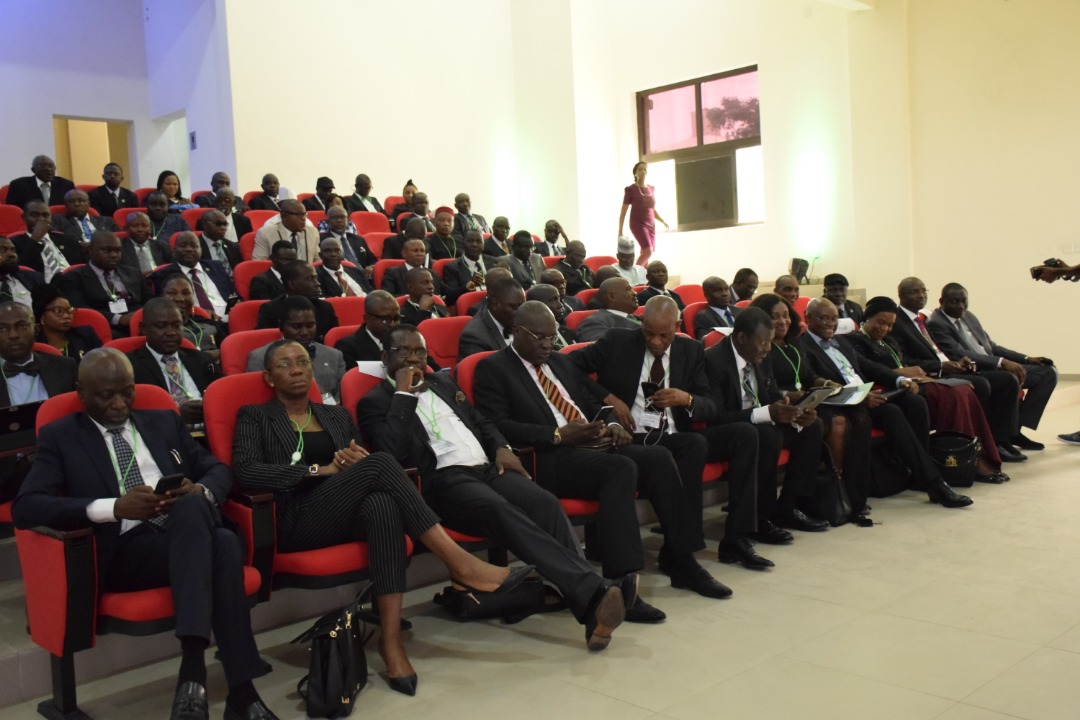
Our third colleague, Lowuruga Obadiah Yabura,
was the former Chairman of our Wukari Branch.
We cannot say whether Yabura is alive or dead. He has not been seen since he was kidnapped
along Wukari-Takum Road in Taraba State on 02 April 2019. Not unlike Kennedy’s case, ransom was paid
for Yabura’s life. Indeed, so
indescribably daring were his abductors, I am told, they set up a bank account where
ransom price was paid into, in instalments and drips and the amounts were fully
drawn by the criminals. Do you blame the
family? No, I cannot. In my function as the President of the NBA, I
have so very often spoken with families of our kidnapped colleagues and almost
always, there is always that dread of fully involving
law enforcement agencies for a number of
reasons. And so, it is not uncommon for the
families to rely on self-help by paying ransom prices and scrupulously
following the instructions of the criminals in the hope – which, as we all
know, dies last – that their son, their breadwinner, their father, their
husband, their brother would eventually be released. In the case of Kennedy, that never
happened. In the case of Yabura, his
abductors are not even communicating with anyone anymore and we have no way of
knowing whether he is still alive or dead.
Again, how do we explain this to his family and dependents? How do we explain the disappearance, without trace,
of this our former Chairman who was called to the Nigerian Bar in 1986?
Where is the responsibility of our
governments in securing lives and property?
My
dear colleagues, as you would observe, I have given you three illustrative instances
of the insecurity that pervades our land from the three NBA Nigerian Zones –
East, West and North – and that, by itself, makes the point that no part of our
country is safe. Just yesterday, 19 June
2019, The Nigerian Guardian newspaper reported that the United Kingdom had
issued travel advisory warning against travels to 21 States in Nigeria. In the South West region of Nigeria, it has
been reported in the last couple of days that the son of the immediate past
Minister of Health was kidnapped. No
region is safe, and no tribe is safe. No
one indeed is safe. And yet, we have
governments in place, at the Federal, State and Local Government levels and the
primary business of governments is the protection of lives and property. Indeed, without security of lives and
property, everything else grinds to a halt.
As the saying goes, “safety first”.
Only those who are alive can enjoy medi-care, educational facilities,
infrastructure renewal, economic boom and all the other tangible and intangible
benefits of a democratic society. And,
by the way, not to be forgotten or diminished by our politicians in power is
the fact that only those who are alive can vote in the next election. Only those who are alive can trigger boom and
prosperity in our economy. Only those
who are alive can benefit from and applaud the government for the war against
corruption. It is therefore in the
interest of the government as much as it is in the interest of the governed for
lives and property to be secured and safe.
We therefore demand from our governments at all levels this basic
minimum of their debt to us, to wit, security of lives and property in the
land.
The second issue that I must address is the state
of the rule of law in our land. I must
state that, in my respectful opinion, the rule of law lies prostrate in our land
in quite some ways and areas. We could,
for example, talk about the penchant of our governmental authorities to disobey
court orders and also the various bottlenecks and glitches that encumber and
inhibit access to justice by the citizens of our country. These are indeed areas that cry for attention
and we would continue to focus on these and other troubling areas. However, my focus in this Address is on what I
term as the twin “independence pillars” of the rule of law – i.e. independence
of the judiciary and independence of the legal profession.
I start with the independence of the
judiciary which we all understand to mean not only the independence of tenure
and control of funds but also the latitude to have an independent and
uncontrolled mind to reach decisions and dispense justice fairly to all manner
of men without fear or favor. Not many
if anyone in this auditorium would doubt that our Judges, from the lowest to
the highest cadre, today operate under an oppressive and pervasive climate of
fear and insecurity. Our Judges are
threatened, intimidated and blackmailed mostly by the executive arms of government
and their agencies both at the Federal and State levels. Ask any Counsel of note who will be willing
to honestly share his or her experience with you these days and you would be
told that a significant consideration in planning the strategy for the
prosecution of any case that the government, notably the Federal Government has
an interest in, is the concern whether the presiding judge has the backbone and
fiber not to be looking continually behind his or her shoulder to decipher how
the government wishes the matter to be determined.
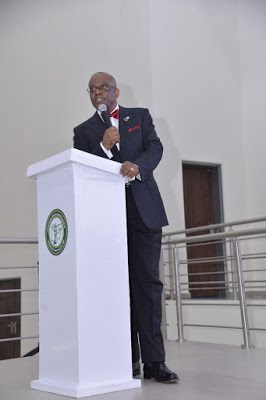
There is the pervasive concern that
government and its security operatives
have dossiers on judges, real or imagined,
and could unleash inquisitorial terror on judges if they decide issues against
governments and its agencies. Even those
of our judges who are whistle-clean – and I believe that most even if not all
are – may not be willing to go through the inquisitorial processes of the
various security agencies to prove their innocence. And so, we have Judges literally walking on
egg-shells, notably, where governments and their agencies have interest in
matters that they adjudicate upon. This
state of affairs totally undermines the independence of the judiciary and the
ability of the Judges to act confidently without fear or favor in dispensing
justice to all manner of men. The irony
of all of these is that the men of power today may be the ones who most need
the independence of the judiciary tomorrow when they are out of power or are competing
for political power. It reminds me of
the International Bar Association bye-line: if you take care of the rule of
law, the rule of law will take care of you.
I will give some other illustrative examples
of the systematic erosion of the
independence of the judiciary. Recently, it was reported, and it has not
been denied that a Chief Judge was walked out of an official function at the
instance of the executive arm of government.
In another State, we are told that the Governor has taken it upon
himself to displace a sitting Chief Judge without any input from the National
Judicial Council. During the Onnoghen CJN’s
saga, the NBA had warned that if the undermining of the judiciary’s independence
was not checked and nipped in the bud, it would spread like cancer and consume Judges
both in the Federal and State Judiciaries.
Sadly, we are now seeing the manifestations of that spread and, by
extension, the denigration of judicial officers and the erosion of the
independence of the judiciary.
In the midst of all these, it is heartening
that a Judge of the High Court has
again pronounced, within the last one week,
that no Legislature or Executive arm of government has the right to attempt the
removal of a Judge without first going through the National Judicial Council
(“NJC”) processes. It remains for us all
to encourage the NJC to rise up to its statutory mandate and protect the
independence of our judiciary. The NBA
stands ready to work with our Judges in that regard. Our Judges cannot deliver justice under a
climate of fear and intimidation.
Justice thrives where and when there is an independent judiciary. There
can be no such independence when there is no security of tenure for our
Judges. There can be no independence of
the Judiciary when our Judges are intimidated, threatened and blackmailed by
State agencies and their officials. There
can be no independence of the judiciary when our Judges are actively coerced by
State officials to think and reason only in the manner that those officials and,
presumably, government want them to think.
The robustness of the judiciary lies, not
only in the soundness of its judgments but in the inherent right of judges to
dissent even amongst themselves and to make independent judgments. If Judges can dissent amongst themselves,
then it should be expected and it is a right that inheres in the office for
Their Lordships to dissent from the opinions, wishes and thinking of State
officials, whether at the Federal or State Governments. Such dissent should not result in the casting
of aspersions on the Judges and/or the blackmail and intimidation of the
Judges. These ignoble and destructive practices must stop. The government must guarantee and we – the
Bar and the Bench – must rise up to protect the independence of the judiciary
and the right of our judicial officers to have independent minds in the
discharge of their onerous responsibilities. We would, by so doing, be
promoting and protecting the Rule of Law in our land.
I now turn to the other twin independence
i.e. the independence of the legal profession.
Permit me to state that it is impossible to have the Rule of Law without
lawyers and an independent legal profession. The independence of the legal profession is
threatened when lawyers are not able to practice their trade without let or
hindrance. That independence is
seriously threatened in our land today.
That independence is assaulted when lawyers are branded as criminals
merely because of their professional functions and responsibilities. The
independence of the legal
profession is eroded when lawyers are
targeted as a group and stigmatized merely because of their professional
duties. And this is happening in our
country today.
It is now the practice for lawyers to turn
down certain types of briefs and
clients in order not to be perceived as being
anti-government and/or its agencies with the attendant inquisitions that go
with such stigmatization. Nowadays,
lawyers discriminate against briefs and instructions, not on professional
grounds, but because they do not wish to attract the inquisitorial attention of
government agencies nor to be stigmatized by those agencies. The same climate of fear and intimidation under
which our Judiciary operates, pervades the practice of law today. That is an absolute erosion of the
independence of the legal profession and a destruction of the
Rule of Law.
Like I said earlier, the irony is that the men of power of today who
strike fear into our hearts and destroy our independence may be the ones
requiring the services of lawyers tomorrow and wishing for or desiring an
independent legal profession.
The two issues that I have raised in this Address
have profound impact and effect on how our society operates. Without the rule of law and security of lives
and property, society gradually descends into a state of anarchy and democracy
becomes a mere pretension. Democracy
itself cannot survive without the rule of law.
These twin elements – rule of law and security of lives and property –
are what drive society and the economy.
It would be revealing if we were to have proper and verified
statistics on the investment opportunities
that have been lost to Nigeria because of these twin pervasive challenges –
i.e. insecurity of lives and property and the erosion of the rule of law. As an Association of Lawyers, we must
constantly rise up to challenge our leaders on these twin fronts. We must hold our leaders accountable for
security of lives and property while also defending and promoting the rule of
law in our society. Our leaders must
also understand that by holding up these two tenets – security of lives and
property and the promotion of the rule of law – they secure their own lives and
wellbeing as well, for, as we must continue to emphasize, if you take care of
the rule of law, the rule of law will take care of you.
On a good and harmonious note, I must conclude
this Address by mentioning that we have fulfilled our electoral promise to
remit 10% of the Bar Practice Fees to our branches. A number of the Branches have already
received their remittance and the others will presently join the ranks of the
recipients. Our colleague, Rabiu Ayuba, the
young man that won a car during the 2018 Annual General Conference but which we
were not able to fulfill due to the state of our purse now has cause to
smile. This afternoon, during the break
period, I will be joined by some of the elders of our Association to present
the car keys to him. We have also
continued in the path of financial prudence, transparency and accountability by
publishing to you our Association’s Q4 Financial Statement. This is a commitment that we made and which
we will continue to keep.
I mention these fulfilled promises merely to
make the point that electoral
promises can be kept when there is the will
to keep them. I am pleased that the NBA under
my watch is displaying these exemplary conducts which I hope our national politicians
and society at large are taking note of.
It surely should be possible for our governments to also fulfill their
electoral mandate of securing our lives and property and promoting the rule of
law. By the way, we still have many more
milestones to achieve. One of these is
the recommencement of our insurance cover which will be concluded very
shortly. There are also outstanding our
electoral commitments to our young lawyers and our various other Forums which
we would also fulfill presently. All of
these and much more would be fulfilled, by the Grace of the Almighty.
Once again, I welcome you, my distinguished
colleagues, to the third NEC
meeting of the present administration. I wish us very fruitful deliberations.
Long live the Nigerian Bar Association.
Long live our Independent Judiciary.
Long live the Federal Republic of
Nigeria.
Paul Usoro, SAN President
